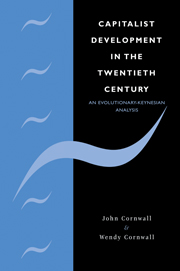Book contents
- Frontmatter
- Contents
- List of figures
- List of tables
- Foreword by David Colander
- Preface
- Part I Framework
- 1 Economic development and economic performance
- 2 The stylized facts
- 3 The neoclassical analysis of unemployment
- 4 An extended Keynesian model
- 5 Institutions and power
- 6 Evolutionary and hysteretic processes
- 7 Theories of capitalist development
- Part II Explaining the development record
- Part III Political control of the economy
- Bibliography
- Index
5 - Institutions and power
Published online by Cambridge University Press: 22 September 2009
- Frontmatter
- Contents
- List of figures
- List of tables
- Foreword by David Colander
- Preface
- Part I Framework
- 1 Economic development and economic performance
- 2 The stylized facts
- 3 The neoclassical analysis of unemployment
- 4 An extended Keynesian model
- 5 Institutions and power
- 6 Evolutionary and hysteretic processes
- 7 Theories of capitalist development
- Part II Explaining the development record
- Part III Political control of the economy
- Bibliography
- Index
Summary
Introduction
An increasing number of economists have come to recognize that institutions affect economic behaviour and performance and must be treated as part of the structural framework. Microeconomists have led in this trend, enriching their formal models by including institutions as determinants of behaviour, often as constraints in optimization models. Macroeconomics has lagged behind; the inclusion of institutions has been concentrated in empirical studies that explain cross-country dierences in macroeconomic performance. In spite of these developments, markets and market behaviour devoid of institutional characteristics remain the primary focus of mainstream neoclassical economics; there is little or no reference to the social context that shapes behaviour, to ‘the macrofoundations of micro’ (Colander, 1996). Not only are the social values and customs that influence preferences ignored, so are those preferences that reflect anything beyond the individual's self-interest; ‘economic man’ is not a social being. In pursuing this paradigm, economics divorced itself from the other social sciences. These have continued to emphasize the central place of social values in guiding behaviour, so that institutions are accepted as necessary to the analysis. But in economics the inclusion of institutions requires justification, and an introduction to ideas unfamiliar to many readers. A fundamental viewpoint of this book is that real world macroeconomic processes can be adequately modelled only if institutions are included, along with technology and tastes, in the structure of an economic system.
- Type
- Chapter
- Information
- Capitalist Development in the Twentieth CenturyAn Evolutionary-Keynesian Analysis, pp. 67 - 93Publisher: Cambridge University PressPrint publication year: 2001

